China Cycling Travelogues
Do you have a China cycling travelogue you would like
to share here?
Contact us for details.
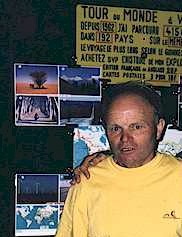
Guinness Book of Records holder
"Epic Journeys"
Around the World by Bicycle - Part 2
Copyright © Heinz Stücke, 2000.
Another accident was the result of an intolerant customs official on the Guatemalan border. After finding out that I had been in Russia, he decided that I must be a Communist. He said that due to the political turmoil in his country the last thing they needed was another Communist. I protested to such reasoning, but to no avail. I left the bicycle at the border to go back to San Salvador and to protest to the Guatemalan Consul there. Before I could lodge my complaint, a friend I was riding with drove his car against a tree and I was unconscious for two days. It took me weeks to recover. Ironically, when I tried to enter Guatemala the second time, over a different border they were very friendly. They insisted that I stay the night, fed me until I couldn't eat anymore and even collected some money for me.
Another accident occurred on the Alaskan highway. It was too late in the year to cycle up north, October, I think. By hard work I had managed to make it to mile 496 at the Liard River, when rains made it difficult to continue. I waited two days and when I started again I ran into two young men from Anchorage whom I had met weeks earlier. They were on their way back to Alaska. "Why don't you come with us?" they asked. "In Alaska the road is paved". Since I could start on the Alaska highway from the other side too, I agreed. In any case I had to come back to White Horse, Yukon to return south. We put the bicycle on top of their sporty GTO car.
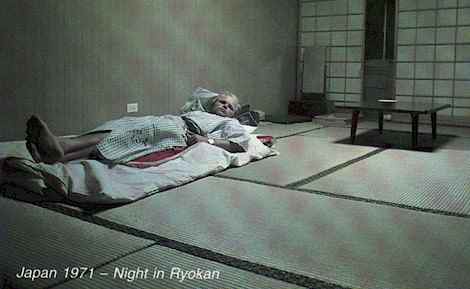
About 10 pm that night Richard took over the wheel. Just a few kms later he took a curve too fast and lost control. The car turned over completed on its way down a steep 20 to 30 metre embankment and landed in a fast flowing river. We scrambled out of the water and I could hear Richard shouting, "God dammit? I did it! I did it! My twelve hundred dollar paint job!! (His car had a beautiful design painted on it). I went back into the river's icy waters to get my belongings. The entire topcarrier with the bike-was 50 metres downstream. Richard kept shouting, "Get out of the water before you freeze to death". The temperature must have been way below freezing point that night because everything became a block of ice seconds after being out of the water. Well, that was the end of that ride.
In a day or so I did what I could to straighten out my bent bicycle and then I pedalled four more days to White Horse. By that time I had had enough of the Alaskan highway. I could not get spare parts for my damaged machine and the winter snow had set in. I did go on to Alaska but left my bicycle behind in White Horse.
In Japan, I must have come close many times to a major accident. Particularly frightening were the many long road tunnels. They were narrow and filled with exhaust fumes and I was pressed against the tunnel walls when trucks went thundering past me. None of the drivers seem to notice me. I was scared as much as I was angry and I really hated those tunnels.
Near Gonbad in Iran another serious accident almost stopped me from continuing my journey. Again I was in a car, this time with an Iranian youth. (I was on the way back to collect my bike which I had left in Mashad earlier). We had a head on collision with another car. In a blind curve the oncoming car, a blue VW, driven by a police officer, suddenly veered across our lane, The crash was terrible. 'That’s it, that’s the end of my journey," I kept thinking. I received head injuries, broken ribs and cuts on the arm. After 10 days in hospital and 3 weeks recovering I cautiously started cycling once again.
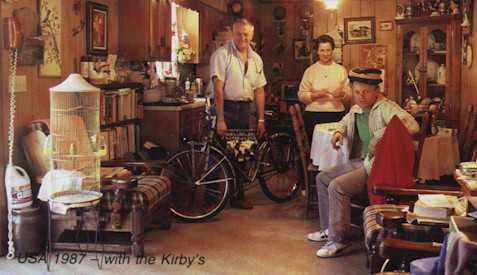
In India during my first tour of the country I used to cycle at night to avoid the heat of the day. I sometimes went through stretches of jungle where I imagined I was being followed by man eating tigers. People had been talking about such beasts. Every little noise in the forest would make me pedal
faster. I got a tremendous shock one night when I cycled full-speed into a buffalo, He was standing quietly in the middle of the road. But generally I learnt not to be afraid of wild animals. They leave you alone if you leave
them alone. That goes for the larger ones anyway. The only ones that really bothered me were the smaller ones, the mosquitoes, flies, fleas, ants, etc. (and bees).
People often ask where I spend the night when on the road. There is hardly a place you could mention where I haven't slept. I hope to make a list some day of all the different places I've stayed in. I suppose most nights have been about equally divided between (1) sleeping in my tent or hammock, (2) in the homes of people who invited me (3) in cheap hotels or (4) youth hostels in Europe, Japan and Asia. But then there were hundreds of unusual places to spend the night such as churches, mosques, temples, shrines, ruins, empty houses, on bridges, under bridges, on benches and on beaches, tables (once on a pool table) in trucks, under trucks, in cars, in trains, on buses or in bus shelters, in offices, in schools, in fire stations, with the Salvation Army, on yachts, in canoes, in pleasure houses, in villas, in the mountains, in police stations, in shacks, garages, stables, caves, prison cells, military camps, in 24-hour truck stops and even once in a telephone box. You name it, I've slept in it. I have also slept in many different body positions and the most difficult of these was "while riding the bike". Twice I have run into a ditch that way. Many nights were spent in Mr. Lees s bicycle store room in H.K. surrounded by hundreds of expensive Cannondales. I was captioning some 7,000 slides taken during travels in China and rebuilding my own bicycle.
Generally I tried to find some kind of shelter. Sometimes I have deliberately slept in unusual places in order to keep a particular spot more clear in my memory. I remember sleeping at the foot of the statue of Christ the Redeemer on Corcovado Hill in Rio de Janeiro, high above the lights of the city and waking up to a spectacular sunrise. I slept on top of the Temple of the Jaguar in Tikal, the ancient city of the Mayas in the jungles of Guatemala and over the ruins of Machu Pichu, the lost city of the Incas. In Ladakh (India) I pitched my tent at 5,200 m for 48 hours during a snow storm, but it was Tang-Lang-La Pass in the same province where I spent a night at 5,360 m (17,582 ft.) after having pushed my bicycle and gear for 3 days.
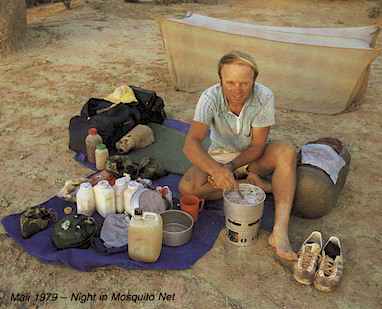
I had a lot of excitement in doing these things, although sometimes it was unexpected. I remember one night in Algeria in 1963 when I cycled in the dark to escape the hostility of the people towards the French. I wasn't French, but that didn't seem to make any difference. Cycling into a mountain area, I found that there was a curfew after dark due to a Kabylian counterrevolution I knew nothing about. When I made it to the top of a steep hill at midnight, a gun was fired. I didn't know if it was meant for me or what. I didn't investigate. In panic I raced down the hill. Although it was cold in the mountains I found myself sweating.
At 3 am I came into a small village and to a little white mosque. The entrance was open and the floor covered with carpets. Without thinking about it too much I spread my sleeping bag on the floor and barricaded the door. Some noise outside woke me up early. Through a little hole in the door I could see many people outside. An old man was knocking at the door. I didn't know what to do and I was a little scared. Hastily I tied the sleeping bag to the bike, mounted it, opened the door suddenly and cycled out. Whatever they had expected, I caught them totally by surprise and was back on the road before anyone could move.
In Japan on the other hand, I could sleep without fear on the steps or inside shrines and would even welcome discovery because more often than not I would be taken inside the caretaker's house, and he would give me food, provide a bed and try to make friends with me.
Another time while cycling through the desert between Cairo and Suez late at night I decided to sleep in the sand under a bridge. A soft desert wind blew from behind. At six in the morning a truck crossed the bridge and I was awakened by thunderous noise and vibrations. began to notice a funny smell. I sat up and then jumped up as if stung by a scorpion. About three feet away was the naked half decomposed body of a human being. Considering that I had only slept for a short time, I got up rather quickly.
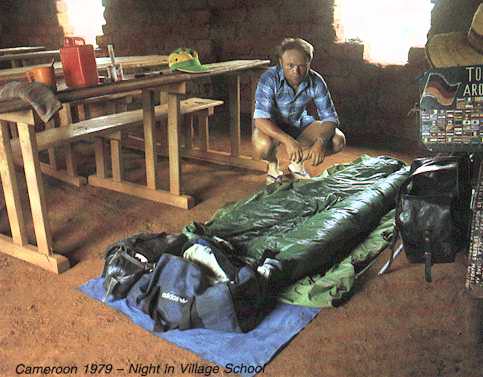
After cycling the last few kms to Suez, I checked into the youth hostel a few kms outside the city. I asked how to get into the city by bus and was directed to the corner bus stop. After a few minutes the bus came and I got on. Straight away I became engaged in conversation with a friendly Egyptian.
The bus was crowded and we had to stand. But the bus didn't move! Everyone became curious. Outside a group of soldiers blocked the street and then began to get on the bus. I heard the word Inglesi" (Englishman) and I looked round to see who they were talking about and found much to my surprise, that they were heading for me. They twisted my arms rather brutally and pushed me out of the bus. On the street they knocked me unconscious. When I came to I saw that the bus passengers were arguing loudly with the soldiers. The man I had been talking to and the bus driver then took me in the bus to a hospital where I was bandaged. The new friend who had come to my aid was very angry about the incident and insisted that we go to the police. With the Chief of Police for Suez we then returned to the scene of the incident and only then did I see the anti-aircraft guns in a field nearby. The soldiers claimed that I was photographing them and that they had only been defending their country. However I didn't even have my camera with me at the time. The Policeman said it had all been a terrible mistake" and that the men would be punished. Bandaged and angry, I left that City the same day.
This brings us to the general difficulties with police and local authorities. When you are visiting a country where there is political turmoil, or if you are unlucky enough to be caught in the middle of a local revolution, you can have plenty of difficulty and it can even be extremely dangerous. In such situations even the police and soldiers are nervous, angry, trigger happy. Often their sentiments turned against me for no apparent reason other than bad feelings towards all capitalistic countries. I may have been seen as a symbol of those countries. I have lived through more than one such violent situation.
To name a few: military coup in Ecuador in 1966, students rebelling against the military in Mexico in 1968. There were times of high tension and fighting, like the French-Algerian conflict of the early sixties or the Arab-Israeli conflict of the same period lasting to the present day. Ethiopians battled Somalis in their border areas in 1963. I also happened to be nearby when a machine gun battle erupted between secret police and guerilla fighters in down town Guatemala City in 1968. None of the police or guerillas were killed, but 5 civilians were.

But on the whole, I had as many good encounters with the police and military, as I had bad ones. Often I stayed in police stations and often I got protection. In meeting military people I preferred the officers of higher ranks. The common soldier I found often to be ignorant. Because of their uniforms and weapons they could be arrogant and dangerous. They often showed strong evidence of "hate" making propaganda against either East or West. In dealing with police, rank was not so important. A man's mood, his prejudice, his money needs would make for either a friendly encounter or a hateful one. This is, of course, a generalisation. There are quite a few differences between countries especially between the prosperous and the underdeveloped ones. Of course in a wealthy country one seldom, if ever, encounters the military. Contacts are mostly with the police, and most of those involve being told what not to do. "You can't cross this bridge". "You can't sleep there". "You can't hitch-hike in this State". "You can't sell your booklets". "You can't cycle on this road".
This reminds me of a funny incident in Texas: I stopped late at night at a 24-hour truck stop. I asked the owner if I could spend the rest of the night writing and reading, At about 4 am I had finished writing up my diary and started to go through four or five 'Time' magazines which I had picked up earlier. I had grown accustomed to tearing out pages as I had read them in order to save weight. Also, even before I began to read I would tear out all the advertising pages which I was not interested in. What difference would a few pages make in comparison with all the equipment I already have to carry? Probably not much, but I am nevertheless very weight conscious.
So, there I was sitting at 4 am, tearing pages out of magazines. The waitress had a strange look on her face and she glanced over to me sometimes in a worried way. At 5 am a squad car appeared outside. The officer ordered me out of the building and studied my papers carefully. He wrote down everything but apparently could find nothing wrong. Finally he asked in a curious tone of voice, "Tell me why did you tear the pages out of those magazines?" When I told him, he grinned and said, "I see. Welcome to Snyder."
I do not recommend carrying concealed weapons for your self-defence. In most countries they are illegal, so you would have to go to a lot of trouble to smuggle them in and out. Of course, in a strange, wild place a gun gives you a feeling of security. But it can also lead to dangerous situations.
One such moment came to me in Africa in Zambia (when it was Northern Rhodesia). I owned a rifle-pistol combination. Totally exhausted, dirty and thirsty, I had come into this black village in the middle of the day when it was 40 degrees C. I saw a sign saying, "Cold Castle Beer" (a South African brand of beer). I quickly downed three or four of these beers and I asked for some food but they only had some eggs.
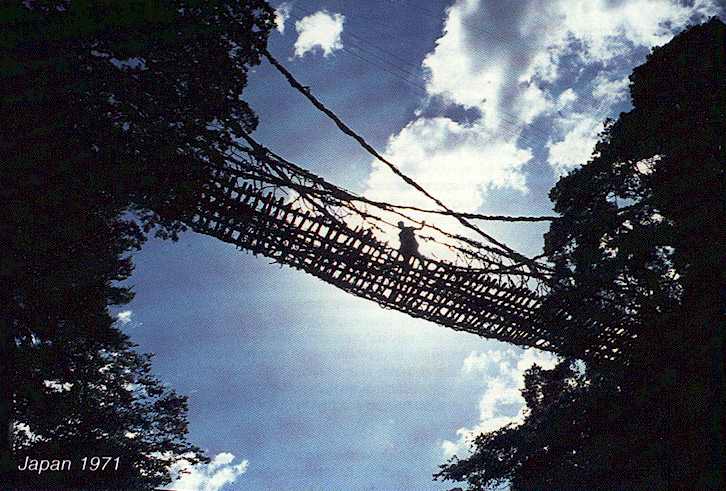
By the time I had finished my sixth bottle of beer I had eaten a dozen eggs. With the 7th bottle in front of me and a shirt soaked in sweat, I relaxed some more.
In the breast pocket of my shirt I carried the pistol. The weight of the weapon was pulling my wet shirt down in an uncomfortable way, so I put the gun on the table. Because people were watching I thought I had better empty the magazine. I put the bullets away and pulled the trigger to release the cock but overlooked that there was another bullet in the barrel. The gun went off and the bullet went into the wall.
I was very lucky indeed that nobody was hurt and I completely sobered up in no time. The people had all got up by this time and I thought that I'd better get going, so after paying the bill and adding a generous tip I staggered out into the bright sun. Behind the village was a steep hill. I made it about half-way up and collapsed.
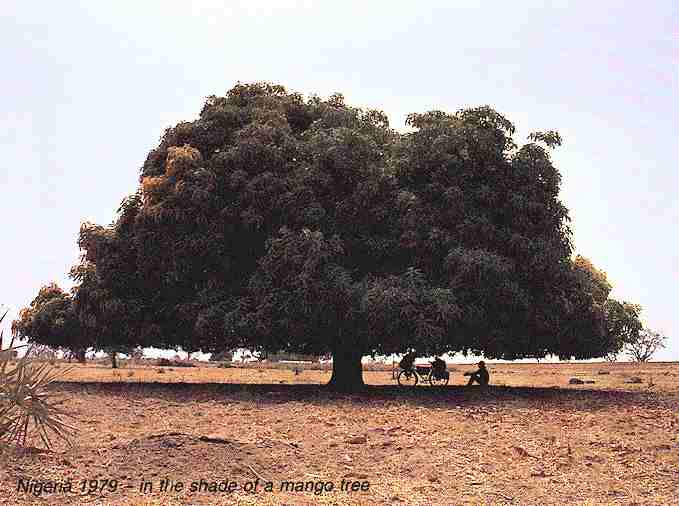
There was something on my face when I woke up. A big dog was standing over me and licking my face. I glanced up not knowing what was going on. Behind the dog a white woman was coming nearer. I heard her saying, "Is there something wrong with you?" "Oh no" I said and carried on up the hill.
Altogether, I only used the weapon a few times, sometimes to chase dogs away and once I shot into the air when two drunks got nasty. I don't remember firing the weapon for real self-defence and in Brazil it was finally taken away from me.
I prefer to travel alone because it is most important to me to be able to set and keep one's own pace. Also, that way I have no-one but myself to blame for any wrong decisions. I believe that a lone traveller learns more because he has to depend more on making contacts in order not to be alone and because he gets more invitations. Alone I have a better chance of getting work, or for example, passage on ships. Now I know I was right and will stay alone, although in the beginning I would have taken a companion if I could have found one.
Every so often and for short times however I would team up with other cyclists or travellers if they were going my way. I did this with Horst Lechner in India in 1961, with Fumiko Mitsue in Japan in 1971 and again in India in 1976 with Martin Eaves, an Englishman on a world cycle tour. But he had to interupt his journey in Calcutta because of hepatitis. I also cycled with Daniel Masson in Laos in 1989. To go trekking in Nepal I joined up with Canadian Walter Ratte, and one trip in the Amazon was with a Swede, Bo Carlo.
I do not feel lonely because I have a vivid imagination and I daydream about a variety of things and make plans for the future. A country exists in my mind even before I arrive there and lives on in my imagination long after I leave it.
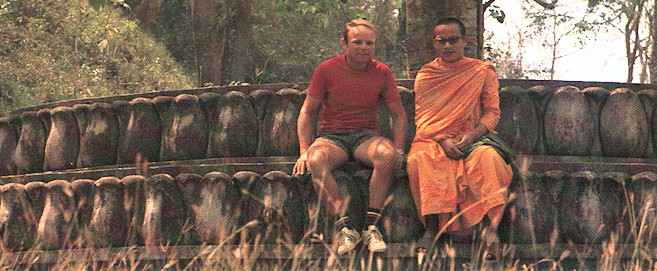
I also own a little radio which I listen to and it has helped me to pick up languages. This way I have learned both Spanish and English which I speak rather fluently now. Since I never studied any language in school I haven't got much knowledge of grammar. I only know what sounds right or wrong. The advantage in learning a language that way is that you learn to speak without much work or effort. But you do not learn how to write it. English is especially difficult to write.
In countries where other languages are spoken (depending on the amount of time I spend there and the necessity of having to use the local tongue) I would pick up enough words to get along or use sign language. But this little knowledge one forgets soon after having left the place. While in Japan I tried to learn only the spoken language. But because of the eagerness of the Japanese to practise their English and because I never had to try and decipher the written language I didn't make a great deal of progress. It is impossible in this short report to talk about all my thoughts on the different countries I have seen, or even to mention every one. But I will try, at least, to give you an impression of my travels.
When I first started I took the Eastern route partly because the countries of Asia stirred my imagination more than other places - Persia, India, China, Japan. What exciting names, especially for a young man of twenty, full of enthusiasm, ambition and wanderlust. Also, going that way would save me the initial cost of crossing an ocean. And, last but not least, it was relatively easy that way to obtain the necessary permits and visas.
Help keep Heinz Stucke rolling!
Make a donation here to his PayPal account!
Skip to: Heinz Stücke Page 1 | Heinz Stücke - Page 2 | Heinz Stücke - Page 3 | Heinz Stücke - Page 4 | Heinz Stücke - Page 5
Bike China Adventures, Inc.
Home | Guided Bike Tours | Testimonials |
| Photos | Bicycle Travelogues
| Products | Info |
Contact Us
Copyright © Bike China Adventures, Inc., 1998-2012. All rights reserved.
